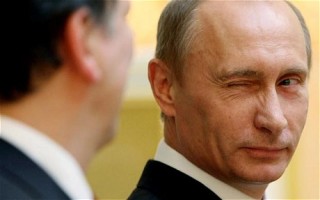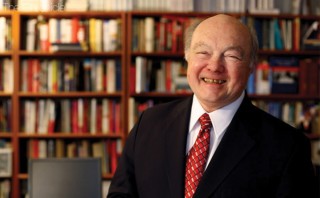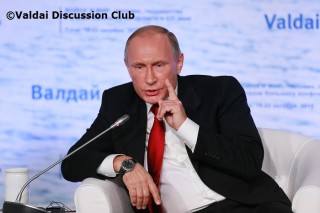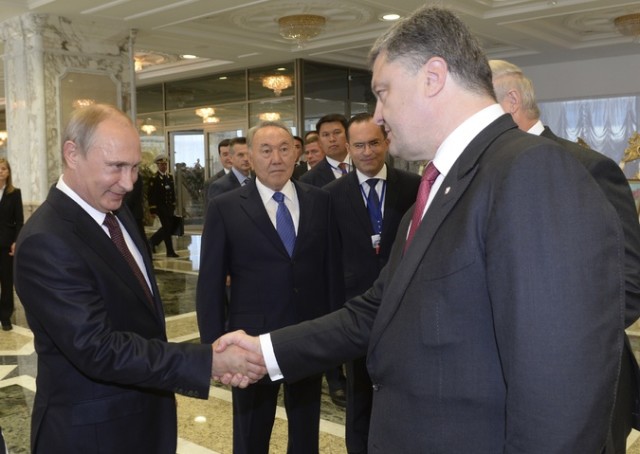Putin’s New World Order Versus the West’s
By Jim W. Dean
We have watched an incredible shift in Western anti-Putin propaganda, which reached hysterical levels early after the Western coup in Kiev was not able to consolidate its power over the entire country.
It seems the largely Russian-heritage population in East Ukraine did not want to go under the boot of fascistic neo Nazis. But on Ukraine, NATO, the US unipolar domination and Syria debacle, Mr. Putin has been proven right.
The Crimeans. reading the tea leaves early. asked Russia for help, which had little interest in losing its major Black Sea base to NATO’s new proxy in Kiev after paying the rent for ten years in advance to assist in Ukraine’s economic woes. When its coup failed in securing the country, the West screamed bloody murder to put the blame on invisible Russian commandos and armored divisions, which no satellite or drone images ever confirmed. Even US Congressmen got suckered using old Russian tank column photos fed to them from the Georgian-Ossetia war.
Russian advisors were there for sure, as military advisors are everywhere within conflicts. Russian volunteers had crossed over to fight in Ukraine, just as Western neo Fascists had, and the usual Blackwater type US defense private contractors.
But Putin never swept across Ukraine in three days as U.S. General Breedlove had claimed was planned. OSCE observers on the Russian border for the planned military exercises there reported over and over that they saw none of the preparation needed for a major offensive.
Related:
http://tradcatknight.blogspot.com/2015/08/putin-is-winning-war-against-satan.html
http://tradcatknight.blogspot.com/2016/02/kissinger-delivered-plan-for-new-world.html
http://tradcatknight.blogspot.com/2015/06/vladimir-putin-wants-to-reinstate.html
http://tradcatknight.blogspot.com/2016/02/rothschild-putin-traitor-to-new-world.html
Regardless of the debunking of Breedlove’s hoax, that was followed by more NATO the silliness about Putin’s goal to retake the Soviet Union’s former East European territory, something that is now looked back on in embarrassment by the Intel community that something so ridiculous would be said publicly which undermined public trust in the stated purpose of NATO.
Western leadership debased itself
by using what many ironically now call old-school Soviet propaganda
tactics against Russia and Putin. Why were so many so brash in their
Putin bashing? My answer is that their focus polls told them that
Westerners had no real feeling about who Putin was, nor how most of
Russia felt about him.
Putin has the highest domestic ratings on any statesman on the planet, with Lavrov just behind him. So the Putin the demogouge hype was along the lines of the Iranian nuclear weapons threat, a pure Western psyops to get the public pumped up to support a future conflict.

While Western think tanks bashed Putin as the new Stalin, his worldwide approval skyrocketed
Mainstream corporate media has not covered these well, as the material is too damaging to the negative propaganda image they have worked to help build against Putin.
His end of the year 2015 Valdai press conference was a sterling example of the Western media’s lying by omission. I meet no one outside of very active alternative media people who had ever heard of Valdai or Putin’s history of addresses and his famous Q&A sessions.
So I wanted to do a highlights piece for not only NEO, but to be able to republish for Western audiences. The video footage shows middle-aged people sitting on the edge of their chairs with laser focus, almost like people at a John F. Kennedy address.
If jealous Western leaders wanted
a valid reason to hate Putin, the best I have seen so far is the
contrast in both style and content that he represents to them. There are
many names for it, but in the US the term “bush leaguer” comes to mind —
people claiming to be in professional sports, but playing for a team or
league that no one has ever heard of.

Putin at Valdai, with attendees on the edges of their seats, knowing they are watching history
I will start with Putin asking former US Ambassador Jack Matlock about the consequences of the US withdrawing from the Anti-Ballistic Missile Treaty, where Matlock objected to the withdrawal but did not think it should pose a threat to Russia.
Putin reviewed that the phony Iran nuclear threat was used like a strawman threat for its being able to nuke European countries, yet that lie was exposed in the successful conclusion of those talks, without even Israel submitting evidence of a secret program.

Former ambassador to Russia, Jack Matlock was a prominent guest at Valdai
An anti-missile screen deployment is all about protecting oneself from retaliation to a Pearl Harbor-type sneak attack — about as serious a threat as there is.
As to the question on the mess in Ukraine, Putin reviewed how the West had supported the election of Yuschenko via a third round of voting that was flagrantly unconstitutional. And this was followed by the violent Western-backed Maidan coup after Yanukovych had agreed to the protesters’ demands.
After Russia had worked with both the Yuschenko and Tymoshenko governments, including continuing subsidies to Ukraine, the West imposed sanctions on Russia for protecting the Russian people in Crimea against the murdering thugs in Kiev. Putin reviewed not only the US involvement in financing opposition in Ukraine, but Russia, also.
This brought up the subject of
the US’ and NATO’s intentions toward Russia, where NATO does its
stand-up comedy routine claiming that its advance toward Russia’s border
should not be viewed as a hostile attack, but as validation that it
would come to the defense of Eastern European countries if they were
attacked by Russia.
Putin reviewed that during the talks on German reunification, the
German partner that Europe’s future should also be settled so as to not
kick that can down the road, which is what happened.
Putin during Valdai Q&A, where he sometimes was asking the questions
“Mr.
Ambassador [Matlock], your colleagues did not reach agreements then
on the basic principles of what would follow Germany’s reunification:
the question of prospective NATO membership for Germany, the future
of military infrastructure, its forms and development,
and the coordination of security issues in Europe.
Oral agreements were reached back then, but nothing was put on paper, nothing fixed, and so it went from there.
But as you
all recall from my speech in Munich, when I made this point, back then,
the NATO Secretary General gave the oral assurance that the Soviet Union
could be sure that NATO – I quote – would not expand beyond the eastern
borders of today’s GDR. And yet the reality was completely different.
There were two waves of NATO expansion eastwards, and now we have
missile defense systems right on our borders too. “
There is an old saying among attorneys that
agreements are made to be broken, and in this case, verbal ones
certainly were. And this seems to have become a habit with the West,
which hawks freedom and democracy like a snake oil salesman, while
subverting non-threatening countries and fomenting regime change for any
profitable purpose that some elite group aspires to. The American
people certainly have not signed on to any of these offensive actions.
“If looks could kill” … Putin and Poroshenko have to shake hands
Kiev had to pass a
new elections law with the agreement of the republics, which was also
not done. It then went ahead and passed one for the rest of Ukraine that
did not include the republics, an overt violation of the Minsk accords.
The amnesty provision was ignored, and the special status for the
republics was ignored by adding article 10, saying that it would only
come into effect after elections. But the elections provision had been
subverted.
Kiev and its various lawyers and Western backers had a
good laugh over this, knowing that most of the Western public would
never know the outright fraud their governments oversaw with Minsk2. One
might ask how could anyone ever justify signing any agreement with the
Kiev coup-meisters and their EU and US bosses, which is a very good
question.Putin’s electoral rating hits 4-year high
According to latest research conducted by Russian state-owned
agency VTSIOM the share of Russians who express willingness to vote for
Putin in the nearest presidential polls is the largest in four years.
“Seventy-four percent
of Russian citizens say that they are ready to vote for Vladimir Putin
at the nearest presidential elections, due in the beginning of 2018.
This is the maximum value in four years and an almost two-fold increase
from 40 percent in October 2012,” reads the letter issued by VTSIOM on Thursday.
“Fifteen percent of responders said they had no plans to support the incumbent president and 11 percent said they cannot give an answer to this question,” the researchers added.
READ MORE: Most Russians want Putin to remain president after 2018 – poll
VTSIOM also noted in the letter that the support for Putin’s candidacy was very high even among those who thought that the president has not yet fulfilled all promises made at the last elections campaign. At the same time, 37 percent of responders hold that the Russian leader has already fulfilled the major part of these promises. The share of those who think that Putin was true to only a part of his promises was 47 percent.
According to the poll conducted by VTSIOM in December last year 57 percent of Russians wanted to see Putin reelected as president in 2018. A further 11 percent said the incumbent president should be replaced by someone he himself proposes as his successor. Eighteen percent said that they would prefer another person as president who would suggest a different political course, while 14 percent of responders said it was too difficult for them to answer the question at the moment.
In the same poll, 48 percent of Russians said that currently no politician in the country could effectively replace Putin, while 33 percent said that the replacement could be found once the need arises and 6 percent answered that they already know a perfect candidate. Twelve percent of respondents said they found the question too complex to answer.
READ MORE: Putin's approval rating hits new historic high of almost 90%
In late October 2015, Putin’s approval rating hit a historic high of 89.9 percent, beating the previous high set in June 2015, when the average monthly rating was 89.1 percent.
In late June 2015, independent Russian pollster the Levada Center reported that according to its data, the share of Russians who are happy with Vladimir Putin’s work as president had reached 89 percent. Sixty-four percent think the current policies of the Russian authorities are correct – also the highest in history. The proportion of Russians who expressed dissatisfaction with Putin’s work was 10 percent.
“Fifteen percent of responders said they had no plans to support the incumbent president and 11 percent said they cannot give an answer to this question,” the researchers added.
READ MORE: Most Russians want Putin to remain president after 2018 – poll
VTSIOM also noted in the letter that the support for Putin’s candidacy was very high even among those who thought that the president has not yet fulfilled all promises made at the last elections campaign. At the same time, 37 percent of responders hold that the Russian leader has already fulfilled the major part of these promises. The share of those who think that Putin was true to only a part of his promises was 47 percent.
According to the poll conducted by VTSIOM in December last year 57 percent of Russians wanted to see Putin reelected as president in 2018. A further 11 percent said the incumbent president should be replaced by someone he himself proposes as his successor. Eighteen percent said that they would prefer another person as president who would suggest a different political course, while 14 percent of responders said it was too difficult for them to answer the question at the moment.
In the same poll, 48 percent of Russians said that currently no politician in the country could effectively replace Putin, while 33 percent said that the replacement could be found once the need arises and 6 percent answered that they already know a perfect candidate. Twelve percent of respondents said they found the question too complex to answer.
READ MORE: Putin's approval rating hits new historic high of almost 90%
In late October 2015, Putin’s approval rating hit a historic high of 89.9 percent, beating the previous high set in June 2015, when the average monthly rating was 89.1 percent.
In late June 2015, independent Russian pollster the Levada Center reported that according to its data, the share of Russians who are happy with Vladimir Putin’s work as president had reached 89 percent. Sixty-four percent think the current policies of the Russian authorities are correct – also the highest in history. The proportion of Russians who expressed dissatisfaction with Putin’s work was 10 percent.

